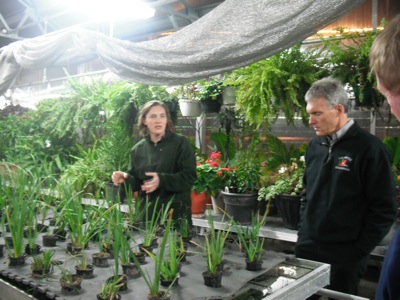Friday, December 10th, 2010
Ag leader: suit against farmers ineffective
By Shelley Grieshop
GRAND LAKE - A local agriculture educator believes a recently proposed lawsuit against farmers for polluting Grand Lake would be fruitless.
"It's certainly not going to help the situation," said Jim Hoorman, a local OSU Extension educator. "We need to work together toward solutions."
Hoorman spends a portion of his time each week teaching farmers in the lake watershed how cover crops, filter strips and other methods can reduce manure run-off into Grand Lake. The phosphorus in livestock manure feeds the lake's blue-green algae, which helps create the toxins that have severely plagued the water in recent years.
Hoorman admits that farmers are slow to adapt to new methods, and changes will take time. But he believes it will happen.
"You have to understand, this is their business, their livelihood," he said. "They've done it their way for over 100 years and no one ever told them they couldn't. It might take 10 to 20 years, but it can happen."
Hoorman said farmers care about the lake but they're "extremely tired of hearing it's their fault." He wondered aloud how the lawyers would identify the violators.
"I wish them good luck with that. It could take 20 years to find that out. If we knew that, we'd go after them ourselves," he said.
Hoorman noted that farmers aren't the only culprits. Homeowners, septic tanks and even geese contribute to the problem, he said.
"What are they going to do, sue the geese?" he asked.
Bill Goodwin of Montezuma said he met earlier this week with other lake-area business people to discuss the possible class-action lawsuit. Several people have already committed to the lawsuit, he said.
The Daily Standard obtained a copy of the proposed legal contract with three out-of-state law firms. The attorneys agree to jointly handle the case at no charge if they were guaranteed 40 percent of any funds recovered plus expenses.
One of the attorneys, Richard Middleton of The Middleton Firm, of Savannah, Ga., said Grand Lake is unique and represents an unusual "nuisance" setting to its neighbors.
"Mercer County has one of the largest concentrations of livestock operations of any county in America," he said.
Middleton said despite the overwhelming problem with the lake, farmers continue to spread manure on frozen ground - one of the items addressed in pending state legislation. Middleton said he spotted a farmer in the process of spreading manure on a field just two days ago.
Middleton and co-counselor Charlie Speer of the Speer Law Firm in Kansas City, Mo., routinely handle court cases for the Center to Expose/Close Animal Factories. The environmental organization battles concentrated animal feeding operations to "change the practices of the industrial agricultural industry," their website at closeanimalfactories.org states.
Middleton said because of other pending cases, the attorneys likely wouldn't move forward with the local case until spring.
Tom Knapke, facilitator for the Grand Lake Restoration Commission, said the local organization believes in working cooperatively within the entire community, which includes agriculture, business, residents and visitors, to continue economic growth. The group was established in January 2010 to work together on solutions to the critical issues facing Grand Lake, he explained.
"By cooperating as a single unit we believe the commission is taking positive steps each day to improve the short- and long-term health of Grand Lake St. Marys," he said.
The commission is finalizing a formal master plan and timeline for lake restoration to be presented to state officials in the near future, he added.
Despite the possibility of a lawsuit in the mix, the group will move forward, Knapke said.
"I think we have to look at it as it's there, we can't control that. We've worked too hard and we'll continue on," he added.




